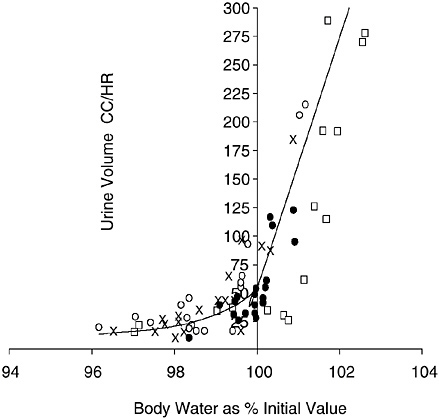Water Weight
Water
Humans are about 60% water with some interpersonal variation based on sex, age, and other factors. Regardless, the human body strongly prefers a specific amount of water and increases urine production dramatically if it has too much:
Additionally, typical adults sweat ~0.3 L per day even in ideal environments, 0.15 L per day in fecal excretion, 0.3 L in breathing, and ~1 L per day through "insensible loss", which is water lost through diffusion through the skin. On the other hand, your body also produces ~0.3 L per day.
Based on this data, we can construct a differential equation relating water above the phase-shift value and how it changes over time assuming you stop drinking assuming a weight of 160 lb:
When you sleep, you typically don't drink for ~8 hours. As you can see, this can reduce variance due to water weight. For instance, if you start with an excess of 2 L, after 8 hours, that drops to an excess of around 0.0 L (and you'd have urinated ~3 times). If you start with an excess of 1 L, you end up at around -0.3 L. This is remarkable: sleep turns a 2.2 pound difference into a 0.9 pound difference. This is why weighing yourself in the morning is ideal - it allows for this mechanism to reduce water weight variance.
Once you get past the ~0 L mark, this effect is less remarkable. Assuming you're not peeing during the night and you aren't completely dehydrated in the morning, there's a range of morning weights that could describe that behavior: roughly -0.7 and -1.8 pounds.
This suggests that even if you could perfectly control for nutrient intake, daily changes in water consumption could realistically cause ~1 pound swings in your weight each morning. This suggests weight deltas have sd=0.4 assuming a uniform distribution. In reality, my morning weight deltas have sd=0.9, so this water intake and excretion explains ~20% of the daily changes in my weight.
The other explanations include matter that eventually becomes feces and factors that cause you to retain more water (e.g. sodium).
Estimating Hydration
While clinically accurate measurement of body water is expensive, but you can get some idea through cheaper methods.
The easiest way to guess your hydration status is based on whether you feel thirsty.
The second easiest is based on your weight now compared to your average weight since most daily/hourly weight change is change in water weight.
Moving on from the obvious, urine is used as in indicator in several ways. The easiest is simply how much you produce:
Urine volume is often used as an indicator of hydration status. If healthy individuals have urine outputs of approximately 100 mL/ hour, they are probably well hydrated (see Figure 4-4). Higher urine outputs (300 to 600 mL/hour) are probably indicative of fluid excess (Freund et al., 1995; Lee, 1964). If urine output falls to less than 30 mL/hour for extended periods with an average diet, the person is probably dehydrated
Some people use its color as an indicator of hydration status but "no precise relationship between urine color and hydration level exists."
You can also use urine and saliva's densities to estimate hydration status, which is theoretically doable with just a scale and beaker, but I'm guessing most people don't want to do that.
Another technique is to use bioelectric impedance analysis (BIA). You can buy a machine that does this for $40 - $150.
Salt, etc.
todo